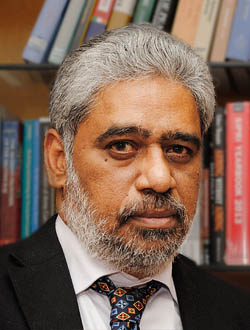Can New Delhi Play Beyond Its Region?

 On Indian strategic talent, ambitions and real capabilities
On Indian strategic talent, ambitions and real capabilities
GB: What do the recent explosions in Tianjin, China mean for India’s view of development? Is there any particular Indian interpretation of those events?
RM: In general terms, the safety culture in China and India is clearly not as deep and advanced as in the West. Tianjin is a good lesson for improving safety in both countries. We always need clear regulations in respect of how chemicals are to be stored and moved. All of this will require far greater national attention and administrative competence across the board.
GB: China is still well ahead of India in infrastructure coverage and quality. Is there general agreement on this in India?
RM: No one quibbles with that. India has much catching up to do. Still, I think that Indian governments are emphasizing this catch-up imperative. They now have to find a framework in which investment can come and drive the building at the highest international standards.
GB: Is India, under the Modi government, conscientiously benchmarking against China – economically and strategically?
RM: The kind of progress that China has made over the last 30 years is clearly something that India wants to emulate. To a degree, most political leaders have seen that, within a generation, an Indian economic transformation is possible. What China has done is a great example and certainly tends to drive a lot of the Indian logic for accelerated economic change.
At the same time, the Indian state is also increasingly conscious of the fact that China’s remarkable economic growth has increased the gap between India and China in national power terms. After all, China’s economy is now more than four times larger than that of India. Dealing with the consequences of that gap is a major national undertaking. So to catch up with China is to cope with China’s new power.
GB: How would India catch up to China in the context of a democratic and federal framework? What levers can you use?
RM: We do not want to change our democratic system simply to catch up with China. So India will have to do what it does within its own framework. But India has, for too long, blamed democracy and federalism for the lack of progress. That cannot wash anymore. In a whole range of areas, better policies, even within the current framework, can produce the desired progress.
GB: What about strategic talent? Does India today have enough strategic thinkers and practitioners or is there a national deficit in this regard?
RM: Ours is not a problem of intellectual talent, but rather of material capabilities. The rest will follow. If you consider the US at the turn of the 20th century, it did not have any talent of the kind that existed in Europe. But in a short period, the US was leading the world in strategic talent – on the strength, also, of superior material capabilities. For India, therefore, the priority is really to accelerate economic development in order to create the basic competencies. Intellectual talent, as I have mentioned, will follow.
GB: But the diplomatic footprint of India remains very small, correct?
RM: They are making an effort to change that – to expand the foreign service somewhat. The government is well aware of the problem. India was run for a long time – even under the British – with a very small bureaucracy. After independence, the focus on the bureaucracy and development diverted from the core competencies of the state. So around the core aspects of the state – diplomacy, defence, intelligence – there has already been a significant ramping up of our human resource capability.
GB: What are the big procurement challenges for the defence and security sector?
RM: The key weakness is the absence of a domestic defence industry capability. For too long the focus was just in the public sector and the defence and research department, the Defence Research and Development Organization (DRDO). That policy has failed. The present government in Delhi is bringing the private sector in, and bringing in foreign direct investment. Together, these two factors could alter the way in which defence products will be produced in India. That has huge potential to change India’s overall capability.
GB: If China is obviously a source of preoccupation for Delhi, how do things stand in respect of Pakistan?
RM: Pakistan remains a problem. That is one of the legacies of partition that India has to manage. But China’s influence and growth are going to create more problems for India in the region both on our own borders and in the rest of the subcontinent. China’s presence is going to alter the way this region is going to look. All of this is happening at a time when the Western world is retreating from the region. By this I mean that there is a real possibility that the US will retrench from India’s western flank after the failures in Afghanistan and Iraq. That makes it even more important for Delhi and Washington to deepen their strategic partnership, improve regional consultation, and coordinate their policies in the Indo-Pacific region.
GB: What is the biggest consequence of Chinese presence and influence for the South Asian region?
RM: China is already our largest trading partner, and en route to becoming our biggest foreign investor. This will make the Chinese the main provider of new infrastructure. Beijing has been providing arms to Pakistan and other countries as well. Chinese national power is going to radiate across to all of us. Dealing with this power is going to loom very, very large for all of the capitals in the region.
GB: The Modi government appears to have an interest in a meaningful role for India beyond the South Asian theatre. What is happening in respect of this ambition?
RM: It remains very much in the atmosphere. There is, to begin with, much greater attention from Delhi to our region, and much greater political energy going into India’s regional policy. I think quite a bit of that will bear fruit.
If we are thinking globally, then there is much to be done in the Indian Ocean, in the Gulf, and in Central Asia. In all these theatres, there is new attention from the government. The so-called extended neighbourhood of India is beginning to loom larger in terms of priority areas like security cooperation and economic engagement.
GB: How do you foresee the next five to 10 years in relations with Pakistan?
RM: I am not expecting any historic breakthroughs in the absence of structural change in Pakistan. And I do not foresee any structural change in Pakistan taking place – particularly in respect of the dominant role of the army in the country. For India, then, the Pakistan problem is one of management, not of finding a solution. The modest objectives should be to keep a measure of peace, regulate the relationship, and avoid a crisis – rather than getting into a very ambitious agenda that involves oscillating between outreach for solutions and preparing for war. We have to be more practical in dealing with talks with Pakistan.
GB: How do you foresee India’s role in Afghanistan over the next five to 10 years?
RM: India’s role will necessarily be modest – contrary to the general perception that we are somehow competing with Pakistan in Afghanistan. Unilateral competition with Pakistan has always been an exaggeration. Our geography does not afford us that luxury, as India does not have a physical border with Afghanistan. So we do not do any mischief there. India must tailor its policies to its geographic limitations, which means that we cannot play the lead role in Afghanistan, but only a secondary role. We will have to work with others in that theatre, just as we have done in many of our development activities during the period of American presence. Of course, that period is probably coming to an end.
GB: But Pakistani presence in Afghanistan is not exaggerated, correct?
RM: Exactly. We cannot stop it. Pakistan has a unique position in Afghanistan. It has an almost 2,500-kilometre open border with Afghanistan. That is Pakistan’s curse as well as its greatest advantage.
GB: What is your view of the Iran nuclear deal?
RM: It is a very good deal. It is long overdue and I welcome Iran’s reintegration into the global mix. India has a lot of work to do with Iran, and this deal opens up space for India in the region.
GB: What about India in the Middle East more broadly, given the great turmoil of that region?
RM: India enjoys a lot of goodwill in the region. We are not into democratic proselytization. What we need to do is to spend more time in the region, and engage it, with all of the key players – Iran, Israel, Turkey, Egypt, Iraq. Historically, India has had good relations with all of them. We need to intensify our level of engagement, reach out to all sides, and be a positive actor in the region.
GB: Do you foresee any possible Indian role in solving the Russia-Ukraine-West conflict?
RM: No. We are not going to get involved. There is no question there. India is not going to make a difference in Eastern Europe.
GB: Could India, as a neutral country (neither in NATO nor in the former Soviet space) that is respected in both Moscow and Kiev, not send peacekeepers to southeastern Ukraine?
RM: This is not our issue, so I think there is no question of India sending troops to Eastern Europe.
GB: How would you rate India-US relations under Modi?
RM: Very good. They are progressing well, as Modi has really put fresh energy into Delhi’s relationship with Washington. Obama has responded. They are meeting again this fall. So expectations are high.
GB: How is the relationship today between India and Russia?
RM: It is pretty good. There is some concern that the economic side has not moved as far and as fast as it should. From the strategic side, there is a worry that the West is pushing Russia into China’s arms. That will clearly not be a good thing for us, so we would be happy to see a reconciliation between the US and Russia, and Europe and Russia – that is, for things to get back to some kind of an even keel. Otherwise, this dynamic will play into Beijing’s hands.
GB: How is the relationship with Bangladesh?
RM: India’s ties with Bangladesh have never been as good as they are today. The very warm political relationship between India’s political leadership and Sheikh Hasina, the current prime minister of Bangladesh, has been reinforced by the resolution earlier this year of the land boundary dispute, and also of the maritime issues in the Bay of Bengal. There is a new commitment in Delhi and Dhaka to build a genuine strategic partnership and to work together for the integration of the eastern subcontinent.
GB: How about relations with Sri Lanka?
RM: Unlike his predecessor, Modi is much better placed to deal with the pressures from Tamil Nadu in managing the complex ties with Sri Lanka. With a majority in the lower house of Parliament, Modi is not under pressure like Manmohan Singh to cede a veto to Tamil Nadu over Delhi’s Sri Lanka policy. Meanwhile, the ouster of pro-China strongman Rajapakse in the presidential elections last January has also created a favourable situation for India in Colombo.
![]()
C. Raja Mohan is consulting editor on foreign affairs for The Indian Express and a distinguished fellow at the Observer Research Foundation, New Delhi. His latest book is Modi’s World – Expanding India’s Sphere of Influence (Harper Collins).









